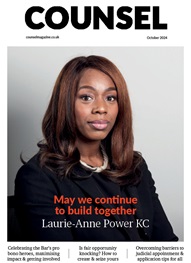*/
The Bar may have got better at recruiting women, but problems remain with their retention and treatment in the profession, according to two Bar Council reports.
In the first, Momentum Measures: Creating a diverse profession, the Bar Council said that a 50:50 balance of men and women entering the profession had been achieved and maintained since 2000.
But, due to issues that mean many women quit, it accepted that achieving a 50:50 split between men and woman practising barristers is “unlikely ever to be reached”.
Head of policy, equality, diversity and CSR, Sam Mercer, said: “The self-employed nature of the profession is a significant barrier to those who wish to have a family and stay in practice and legal aid cuts are making retention even more difficult.”
The second report, Snapshot: The experience of self-employed women at the Bar, painted a picture of sexism and harassment, with women objectified, discriminated against and pigeon-holed into doing family law or sexual offence cases because of their gender.
Among the litany of examples was that of a pupil who alleged that her supervisor told her she looked “quite fuckable” and said she ought to wear a jacket because he was “only human”.
One barrister said her senior clerk sold her to a solicitor on the basis that she had “a great pair of legs”.
While another said: ‘Too many men at the Bar feel that they are existing in a children’s playground, [they] think they can say grossly disrespectful things because nobody is going to stop them.”
Bar chair Alistair MacDonald QC said: “Whilst most of the experiences of sexism, harassment and discrimination quoted in the report are historical, experiences of inappropriate behaviour within the profession continue to exist.”
Although some women had “negative experiences and worked in a very challenging environment”, MacDonald said those who participated in the research “loved” the Bar. Others’ positive experiences, he said, challenge the view that the Bar is not women–friendly.
Meanwhile, the Lord Chief Justice, Lord Thomas, expressed disappointment that there had been “little marked improvement” in the percentage of judges from black and minority ethnic (BME)backgrounds, following publication of the 2015 Judicial Diversity Statistics.
The data showed that 159 of the 2,686 (5.9%) judges were from a BME background, up slightly from the 5.1% (154 out of 2,992) in 2011.
The Bar may have got better at recruiting women, but problems remain with their retention and treatment in the profession, according to two Bar Council reports.
In the first, Momentum Measures: Creating a diverse profession, the Bar Council said that a 50:50 balance of men and women entering the profession had been achieved and maintained since 2000.
But, due to issues that mean many women quit, it accepted that achieving a 50:50 split between men and woman practising barristers is “unlikely ever to be reached”.
Head of policy, equality, diversity and CSR, Sam Mercer, said: “The self-employed nature of the profession is a significant barrier to those who wish to have a family and stay in practice and legal aid cuts are making retention even more difficult.”
The second report, Snapshot: The experience of self-employed women at the Bar, painted a picture of sexism and harassment, with women objectified, discriminated against and pigeon-holed into doing family law or sexual offence cases because of their gender.
Among the litany of examples was that of a pupil who alleged that her supervisor told her she looked “quite fuckable” and said she ought to wear a jacket because he was “only human”.
One barrister said her senior clerk sold her to a solicitor on the basis that she had “a great pair of legs”.
While another said: ‘Too many men at the Bar feel that they are existing in a children’s playground, [they] think they can say grossly disrespectful things because nobody is going to stop them.”
Bar chair Alistair MacDonald QC said: “Whilst most of the experiences of sexism, harassment and discrimination quoted in the report are historical, experiences of inappropriate behaviour within the profession continue to exist.”
Although some women had “negative experiences and worked in a very challenging environment”, MacDonald said those who participated in the research “loved” the Bar. Others’ positive experiences, he said, challenge the view that the Bar is not women–friendly.
Meanwhile, the Lord Chief Justice, Lord Thomas, expressed disappointment that there had been “little marked improvement” in the percentage of judges from black and minority ethnic (BME)backgrounds, following publication of the 2015 Judicial Diversity Statistics.
The data showed that 159 of the 2,686 (5.9%) judges were from a BME background, up slightly from the 5.1% (154 out of 2,992) in 2011.


Our call for sufficient resources for the justice system and for the Bar to scrutinise the BSB’s latest consultation
Marie Law, Head of Toxicology at AlphaBiolabs, discusses alcohol testing for the Family Court
Louise Crush of Westgate Wealth explains how to make sure you are investing suitably, and in your long-term interests
In conversation with Matthew Bland, Lincoln’s Inn Library
Millicent Wild of 5 Essex Chambers describes her pupillage experience
Louise Crush of Westgate Wealth explores some key steps to take when starting out as a barrister in order to secure your financial future
From a traumatic formative education to exceptional criminal silk – Laurie-Anne Power KC talks about her path to the Bar, pursuit of equality and speaking out against discrimination (not just during Black History Month)
James Onalaja concludes his two-part opinion series
Expectations, experiences and survival tips – some of the things I wished I had known (or applied) when I was starting pupillage. By Chelsea Brooke-Ward
If you are in/about to start pupillage, you will soon be facing the pupillage stage assessment in professional ethics. Jane Hutton and Patrick Ryan outline exam format and tactics
In a two-part opinion series, James Onalaja considers the International Criminal Court Prosecutor’s requests for arrest warrants in the controversial Israel-Palestine situation